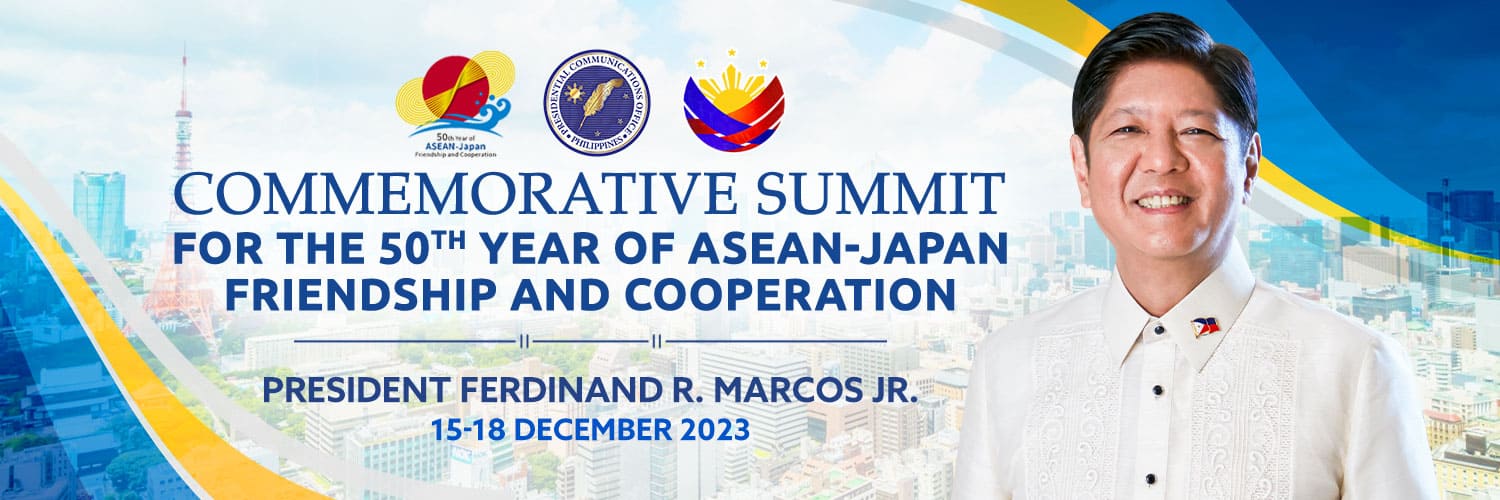
President Ferdinand R. Marcos Jr. on Sunday called on the ASEAN-Japan Friendship and Cooperation Summit to come up with a 10-year roadmap on new technologies and climate-resilient plans to ensure food security in the region.
Marcos made the call as he sees Japan as a major player in the economic development of Southeast Asia as well as in addressing climate change and the region’s adoption of new technologies.
As one of the country’s most vulnerable to the negative impacts of climate change, Marcos said he encourages new agricultural technologies and the crafting of a climate change-resilient, sustainable, inclusive, and people-centered ASEAN-Japan Strategic Economic Cooperation Roadmap beyond 2025 for the next 10 years.
With regard sustainable energy security and clean energy use, the Philippines encourages ASEAN Member States and Japan to undertake novel joint ventures to reduce carbon emissions, promote renewable energy, and enhance environmental sustainability.
“I am confident that this partnership will continue to grow and expand with the AJCEP Agreement [ASEAN-Japan Comprehensive Economic Partnership Agreement] and RCEP [Regional Comprehensive Economic Partnership Agreement] in place,” President Marcos said in his intervention during the ASEAN-Japan Commemorative Summit Session Two in Tokyo.
“Furthermore, with the recent addition of the “ASEAN-Japan Economic Co-Creation Vision” that recommends the future direction of ASEAN-Japan cooperation, we anticipate an even more vigorous economic relation,” he said.
Marcos said the Philippines is keen to collaborate with Japan to bring about the initiatives set out in the Future Design and Action Plan for Innovative and Sustainable ASEAN-Japan Economic Co-Creation 2023 – 2033, noting the country’s young, dynamic, and skilled people are certain to play a vital role in shaping this vision in the path towards Industry 4.0 Economy.
And following the 28th Session of the Conference of Parties to the UNFCCC in Dubai (COP28), Marcos indicated the Philippines’ willingness to host the headquarters of the Loss and Damage Fund Board.
He also welcomed new cooperation initiatives with Japan that facilitate the development of robust supply chain strategies against future disruptions and shocks in ASEAN, through diversification, digitalization, and risk management.
“As the world becomes more interconnected, ASEAN must develop its physical connectivity and digital infrastructure as foundations for sustainable and inclusive economic growth, economic integration, competitiveness, and resilience,” Marcos said, adding ASEAN and Japan must also expand digital literacy to foster innovation and inclusivity and facilitate the digital transformation of their economies.
“We would appreciate, in this regard, the continued exchange of technological know-how and best practices between ASEAN Member States and Japan and investment in human capital and upskilling through various scholarship programs for ASEAN Member States,” he said.
Japan is one of ASEAN’s most important Comprehensive Strategic Dialogue partners, with the ASEAN-Japan relationship encompassing various areas such as security, trade and investment, food security, climate action, energy security, supply chain resilience, infrastructure development, and connectivity.
Japan is also ASEAN’s 4th largest trading partner and the 4th biggest source of the bloc’s Foreign Direct Investments (FDIs). *PND*

